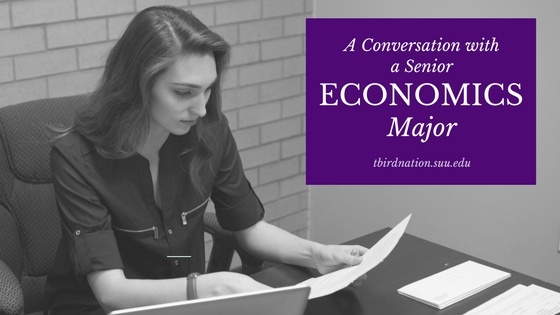A Conversation with a Senior Economics Major
Posted: September 30, 2016 | Author: Cami Mathews | Read Time: 4 minutes

The economics program provides students with high quality educational opportunities and excellent preparation for professional careers or graduate school. Undergraduate students regularly engage in research projects and individualized learning activities with faculty.
Economics is an unusual major that is both liberal arts, since it is a social science, and professional, since it is a fundamental discipline for business. Students who graduate with this major have entered careers in areas such as financial services, government sectors, general businesses, and more. Economics is also a great major to prepare for MBA or Law programs.
Miranda Jones, a Senior dual major in Political Science and Economics, gave us an inside look at what it takes to be an Economics major and the path she took to get there.
Why did you choose to be an Economics major?
“Originally a biology major, I had no idea what one could learn from business, marketing, and economics. When I switched to Political Science, I realized the two majors go hand-in-hand. There was also something utterly fascinating about behavior of politicians, businessmen, people in general when there is money involved.”
How much homework do you have each night related to your major?
“Just like any major it depends on the classes that you’re in, but I would say anywhere from 3-6 hours a day; more for upper-division courses.”
What type of homework do you have?
“You know on your resume when you put your skills, if you’re an Economics major, wizard of Excel will be your new skill. There are other areas of work, such as research, problem sets, online coursework, but Excel will be there every time.”
How have your Economics classes applied to real-life situations?
“One of my classes we dedicated to performing a cost-benefit analysis of the Cedar city Fire Department which helped them make a million-dollar business decision.”
Are there classes that are better to take online? Vice versa, are there classes that are better to take in person?
“If you can, I would suggest taking all of your Economics classes in person. Earlier classes like Microeconomics and Macroeconomics are easier to take online, but having discussions with your peers and professor can be a valuable experience.”
Are there classes you should not take in the same semester?
“The greatest advisor, Paula Alger, told me not to take Econometrics and Decision Modeling in the same semester. But guess which two I need to finish up my degree this semester? I’ll let ya know how it goes.”
Should students be aware of taking certain classes first as a prerequisite?
“Absolutely. Keep in close contact with your advisor because there is definitely a timeline that the students should follow.”
How much free time to do you have with this major?
“While everyone is different, I have been able to balance two majors, a part-time job, internship experience, and work with the Leavitt Center on campus.”
What internships or jobs are available for an Economics major while in school?
“I actually fulfilled a 3 credit internship while working with the Senate Majority Whip at the Utah State Legislature during the 2016 general session. Internships are a must and this one specifically brought me greater insight into Utah’s economic policy.”
What are possible career paths for an Economics major?
“One can go into the public or private sector, working as an economist, statistician, financial advisor, etc. I plan to take my degree and work as a policy advisor in the government sector.”
What is something you wish someone would have told you when you started your first day of college?
“I wish someone would have told me that I was going to mess up, that I was going to fail tests, that I was going to change my major several times, and that it will all end up okay.”
9 Facts you Didn’t Know about Being an Economics Major
1. Homework will range from 3-6 hours a day
2. You will have more homework once you get into your upper-division courses
3. You will become an Excel Wizard
4. Research will be a part of your work every step of the way
5. There will be real-life scenarios in your classes, showcasing the work you will do once you graduate
6. Your beginning classes, such as Microeconomics, can be taken online; but it’s best to take all Economics classes in person
7. There is a timeline for the classes you will have to take, so follow it carefully
8. Become best friends with your Academic Advisor- they will save your life
9. Serve an internship at some point to gain internship credit and valuable experience (an internship at the Utah State Legislature is perfect for this.)
This article was published more than 3 years ago and might contain outdated information or broken links. As a result, its accuracy cannot be guaranteed.
Tags: School of Business Majors




